Cardiogen 20mg (Bioregulator)
$65.00
Cardiogen, is a bioregulator peptide which appears to have potent effects on multiple body tissues including the heart and prostate. Additionally, the peptide may be beneficial in the treatment of certain types of cancer, particularly sarcoma. Currently, the biggest benefits of cardiogen appear to be in the settings of heart attack, hypertension, and chronic heart failure where the peptide not only offers benefits of its own accord, but acts in a synergistic manner with established treatments.
Cardiogen is a short peptide with known properties as a bioregulator. Research shows that its primary effects are on fibroblasts, the cells responsible for tissue repair and scar formation throughout the body. Though the focus on cardiogen has been on its role in a variety of cardiovascular diseases (hence the name), research shows that its ability to alter fibroblast activity has potential benefits in a variety of tissues. In addition, cardiogen appears to by a synergistic peptide, enhancing the benefit of certain standard therapies and thereby improving long-term outcomes while reducing side effects. Finally, preliminary research in rat models suggests that cardiogen may increase rates of apoptosis in tumor cells.
Cardiogen and the Heart
In the heart, cardiogen appears to stimulate cardiomyocyte proliferation while reducing fibroblast growth and development. This leads to decreased scar formation and improved long-term outcomes in regards to cardiac remodeling leading to heart failure. Additionally, it appears that cardiogen 20mg can decrease p53 protein expression and thereby diminish rates of apoptosis[1].
Cardiogen and Cancer
Even though cardiogen reduces apoptosis in heart cells by down-regulating p53 expression, it may have the opposite effect in tumor cells. Research in rat models of M-1 sarcoma shows that apoptosis levels are higher in the tumor cells following cardiogen administration. What is more, the effect is does-dependent, indicating that the biological effect is real[2]. The peptide appears to enhance apoptosis in tumor cells and may be somewhat selective for tumor cells due to their enhanced and unusual vascular supply. This may make cardiogen a targeted treatment for at least some types of cancer. In addition, if the peptide enhances the action of standard cancer treatments (as it does in heart disease treatment), then it may prove a very potent addition to the arsenal of cancer fighters.
Cardiogen and the Heart
Doctors Levdik and Knyazkin, both of whom have worked in some capacity with Vladimir Khavinson through the St. Petersburg Institute of Bioregulation and Gerontology and the Russian Academy of Medical Sciences, have extensive experience researching the impact of amino acids and short peptides on both cancer and healthy tissues as they become dysfunctional and precancerous. Their work with Cardiogen 20mg has positioned it as the next possible candidate for approval, in Russia, for the treatment of sarcoma.
Cardiogen 20mg and the Prostate
Research in tissue cultures shows that cardiogen, along with several similar peptides, alters the expression of signaling factors in fibroblasts of the prostate. Levels of these signaling factors are important in establishing favorable a microenvironment within tumors and may contribute to both the development and progression of prostate cancer. Solid evidence shows that the synthesis of these markers is substantially altered in aging and senescent fibroblasts, which may explain why prostate cancer is almost ubiquitous in older men but nearly unheard of in younger men[3]. In fact, studies show that cardiogen can normalize levels of these signaling molecules to match or even improve upon what is seen in young cell cultures, suggesting that cardiogen may be effective both in preventing prostate cancer and in controlling its progression once it develops[4].
Cardiogen Summary
Cardiogen 20mg, while less researched than some other bioregulators, appears to have potent effects on multiple body tissues including the heart and prostate. Additionally, the peptide may be beneficial in the treatment of certain types of cancer, particularly sarcoma. Currently, the biggest benefits of cardiogen appear to be in the settings of heart attack, hypertension, and chronic heart failure where the peptide not only offers benefits of its own accord, but acts in a synergistic manner with established treatments.
Cardiogen exhibits minimal side effects, good oral and excellent subcutaneous bioavailability in mice. Per kg dosage in mice does not scale to humans. Cardiogen for sale at Peptide Sciences is limited to educational and scientific research only, not for human consumption. Only buy Cardiogen if you are a licensed researcher.
Frequently Asked Questions (FAQs) – Cardiogen 20mg (Bioregulator)
What is Cardiogen 20mg?
Cardiogen is a synthetic tetrapeptide with the amino acid sequence H-Ala-Glu-Asp-Arg-OH (AEDR). It is classified as a bioregulator peptide and has been studied for its potential effects on cardiovascular function and tissue repair.
What is the molecular composition of Cardiogen?
-
Molecular Formula: C₁₈H₃₁N₇O₉
-
Molecular Weight: 489.5 g/mol
-
Synonyms: SCHEMBL3194515
-
PubChem CID: 156613454 Biotech Peptides+3canlabintl.
What are the research applications of Cardiogen?
Cardiogen has been studied in various research contexts, including:
-
Cardiovascular Health: Investigated for its potential to stimulate cardiomyocyte proliferation and reduce apoptosis in cardiac tissues.
-
Tissue Repair and Regeneration: Explored for its effects on fibroblasts, which are involved in tissue repair and scar formation.
-
Cancer Research: Studied for its potential tumor-inhibiting effects, particularly in sarcoma models.
-
Prostate Health: Researched for its role in modulating signaling factors in prostate fibroblasts.
How does Cardiogen function at the cellular level?
Studies suggest that Cardiogen may:
-
Stimulate the proliferation of cardiac cells while inhibiting fibroblast activity.
-
Reduce the expression of p53 protein, potentially inhibiting apoptosis in cardiac tissue.
-
Promote the regeneration of damaged heart muscle by stimulating cardiac progenitor cells.
What are the key findings from studies involving Cardiogen?
Research has indicated that Cardiogen:
-
Shows stimulating effects on cell proliferation in heart tissue from young and old rats.
-
Demonstrates potential tumor-inhibiting effects in rat models of sarcoma.
-
May regulate signaling factors in prostate fibroblasts.
Is Cardiogen approved for human use?
No, Cardiogen is designated strictly for research purposes. It is not approved for human consumption or clinical use. Handling of this product should be undertaken only by licensed, qualified professionals.
Where can researchers purchase Cardiogen?
Cardiogen is available for purchase from several reputable biotech suppliers for research purposes, including:
-
Limitless Life Nootropics Limitless Life Nootropics
Vendor: PeptideNationUSA
5 reviews for Cardiogen 20mg (Bioregulator)
Add a review Cancel reply
Related products
Bioregulators
Bioregulators
Bioregulators
Bioregulators
Bioregulators
Bioregulators
Bioregulators
Bioregulators

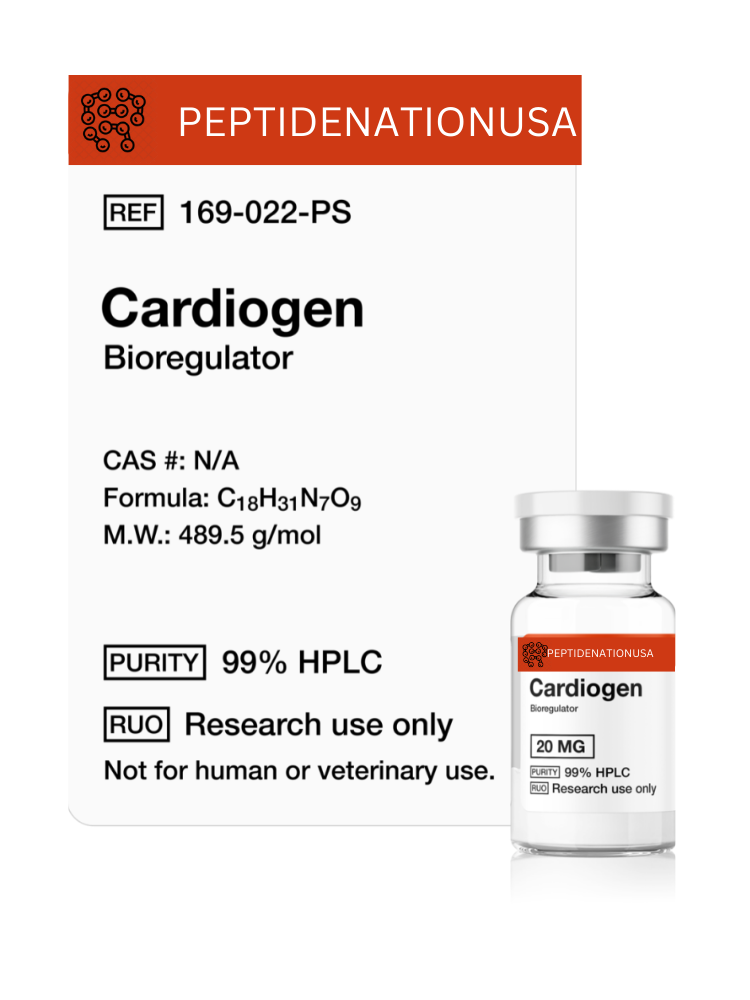

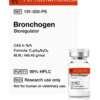
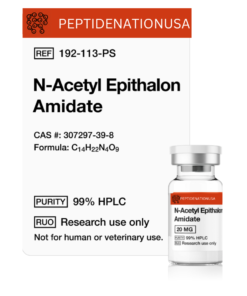

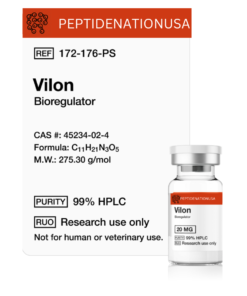
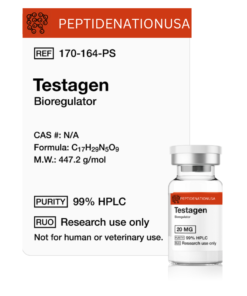


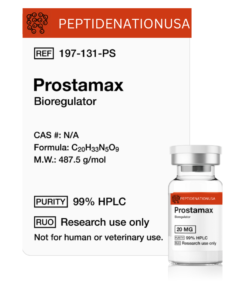



Tyler Green –
It worked better than I expected. I feel more balanced and healthier
Michael Carter –
Perfect for what I needed. Thank you!
Rebecca Green –
Highly recommend this bioregulator. It’s made a big difference for me.
Tyler Foster –
Helped with my symptoms almost immediately
Michael Nguyen –
It worked better than I expected. I feel more balanced and healthier